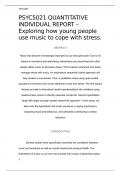Case
Music and coping mechanisms
- Module
- Psychology (PSYC5021)
- Institution
- Oxford Brookes University
Music has become increasingly important as our lives get busier. Due to its impact on emotions and well-being, researchers are examining how often people utilise music to decrease stress. This research examines how teens manage stress with music. An exploratory sequential mixed approach will help s...
[Show more]



